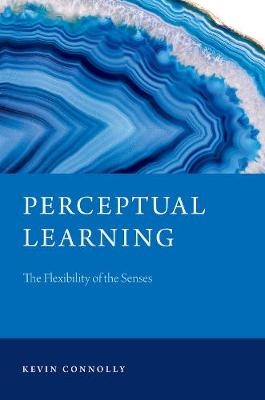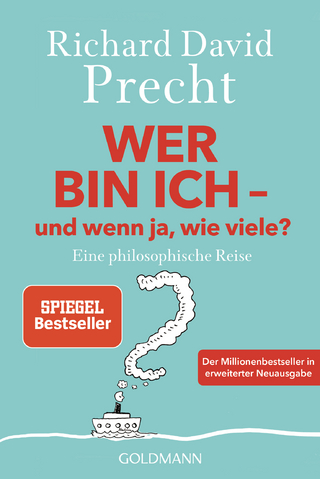
Perceptual Learning
Oxford University Press Inc (Verlag)
978-0-19-066289-9 (ISBN)
This book uses recent evidence from psychology and neuroscience to show that perceptual learning is genuinely perceptual, rather than post-perceptual. It also offers a taxonomy for classifying cases in the philosophical literature. In some cases, perceptual learning involves changes in how one attends; in other cases, it involves a learned ability to differentiate two properties, or to perceive two properties as unified. Connolly uses this taxonomy to rethink several domains of perception in terms of perceptual learning, including multisensory perception, color perception, and speech perception.
As a whole, the book offers a theory of the function of perceptual learning. Perceptual learning embeds into our quick perceptual systems what would be a slower task were it to be done in a controlled, cognitive manner. A novice wine taster drinking a Cabernet Sauvignon might have to think about its features first and then infer the type of wine, while an expert can identify it immediately. This learned ability to immediately identify the wine enables the expert to think about other things like the vineyard or the vintage of the wine. More generally, perceptual learning serves to free up cognitive resources for other tasks. This book offers a comprehensive empirically-informed account, and explores the nature, scope, and theoretical implications of perceptual learning.
Kevin Connolly is a cognitive scientist and philosopher who works on learning. His research focuses especially on perception-based learning, as found in experts from wine tasters to radiologists to bird watchers. He is currently an Assistant Professor of Psychology at Minerva Schools at KGI-a new university founded on the principles of the science of learning-where he plays a central role in curriculum design for the School of Social Sciences. Prior to Minerva he was an Andrew W. Mellon Postdoctoral Fellow at the University of Pennsylvania.
PREFACE
PART 1. THE NATURE OF PERCEPTUAL LEARNING
I. HOW TO UNDERSTAND PERCEPTUAL LEARNING
1.1 Introduction
1.2 What Is Perceptual Learning?
1.3 A Taxonomy of Perceptual Learning Cases
1.4 The Offloading View of Perceptual Learning
1.5 Looking Ahead
II. IS PERCEPTUAL LEARNING GENUINELY PERCEPTUAL?
2.1 Introduction
2.2 Skepticism about Perceptual Learning as Genuinely Perceptual
2.3 Introspective Evidence that Perceptual Learning Is Genuinely Perceptual
2.4 Neuroscientific Evidence that Perceptual Learning Is Genuinely Perceptual
2.5 Behavioral Evidence that Perceptual Learning Is Genuinely Perceptual
2.6 Conclusion
PART 2. THE SCOPE OF PERCEPTUAL LEARNING
III. LEARNED ATTENTION AND THE CONTENTS OF PERCEPTION
3.1 Introduction
3.2 The Phenomenal Contrast Argument
3.3 The Attentional Reply to the Phenomenal Contrast Argument
3.4 The Blind Flailing Model of Perceptual Learning
3.5 A New Attentional Reply to the Phenomenal Contrast Argument
3.6 Learned Attention and the Offloading View
IV. LEARNED ATTENTION II: SENSORY SUBSTITUTION
4.1 Introduction
4.2 Attentional Weighting in Distal Attribution
4.3 Latent Inhibition as a Kind of Learned Attention
4.4 Applying Principles of Attentional Training to Sensory Substitution
4.5 Perceptual Learning and Perceptual Hacking
4.6 An Empirical Test for Determining the Nature of SSD Experience
4.7 Conclusion
V. "CHUNKING" THE WORLD THROUGH MULTISENSORY PERCEPTION
5.1 Introduction
5.2 The Kind of Conscious Awareness We Have in Multisensory Perception
5.3 Unitization as a Perceptual Learning Mechanism
5.4 Applying Unitization to Multisensory Cases
5.5 Objections and Replies
5.6 Unitization and the Offloading View
5.7 Conclusion
VI. LEARNING TO DIFFERENTIATE PROPERTIES: SPEECH PERCEPTION
6.1 Introduction
6.2 The Phenomenal Contrast Argument for Hearing Meanings
6.3 The Argument from Homophones
6.4 The Role of Differentiation in Speech Perception
6.5 Why Perceptual Learning Does Not Support the View that We Hear Meanings
6.6 The Offloading View and Speech Perception
6.7 Conclusion
VII. LEARNING TO DIFFERENTIATE OBJECTS: THE CASE OF MEMORY COLOR
7.1 Introduction
7.2 Memory Color and Cognitive Penetration
7.3 A Brief Survey of Memory Color Studies
7.4 Why Memory Color Is Not a Mechanism for Color Constancy
7.5 Applying Differentiation to Memory Color
7.6 Memory Color and the Offloading View
7.7 Conclusion
CONCLUSION: PERCEPTUAL LEARNING BEYOND PHILOSOPHY OF MIND
ACKNOWLEDGEMENTS
REFERENCES
| Erscheinungsdatum | 25.02.2019 |
|---|---|
| Reihe/Serie | Philosophy of Mind Series |
| Verlagsort | New York |
| Sprache | englisch |
| Maße | 213 x 142 mm |
| Gewicht | 454 g |
| Themenwelt | Geisteswissenschaften ► Philosophie ► Metaphysik / Ontologie |
| Geisteswissenschaften ► Psychologie ► Allgemeine Psychologie | |
| Geisteswissenschaften ► Psychologie ► Verhaltenstherapie | |
| ISBN-10 | 0-19-066289-1 / 0190662891 |
| ISBN-13 | 978-0-19-066289-9 / 9780190662899 |
| Zustand | Neuware |
| Informationen gemäß Produktsicherheitsverordnung (GPSR) | |
| Haben Sie eine Frage zum Produkt? |
aus dem Bereich


